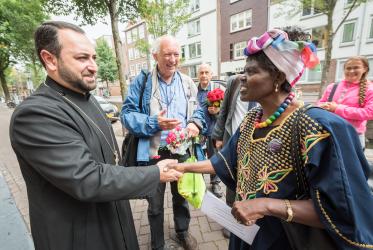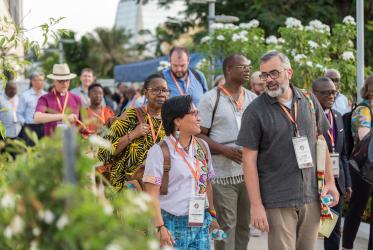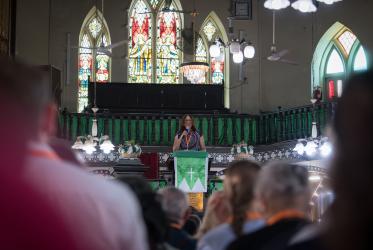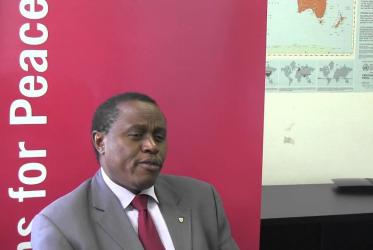“Remember your leaders, those who spoke the word of God to you; consider the outcome of their way of life and imitate their faith” (Hebrews 13:7).
This was the verse that His Holiness Moran Mor Ignatius Aphrem II, Patriarch of Antioch and all the East, the Supreme Head of the Universal Syriac Orthodox Church, included in an encyclical declaring 2021 as the 1500 Jubilee Year of St Jacob of Serugh, the harp of the Holy Spirit.
In this encyclical, His Holiness encouraged all the faithful to contemplate the life of this great saint, taking him as an example to follow and learn from in upholding the Orthodox faith and the correct apostolic teachings.
I would like to share with our fellow Christians and ecumenical partners few points about the life of St Jacob of Serugh.
This saint was born in the village of Kurtam near Serugh in Mesopotamia in the year 451.
He studied at the school of Urhoy (Edessa), where he mastered the Syriac language and theology.
His father was a priest. He accompanied his father to the church when he was still three years of age, at which time the spirit projected to him in a miraculous scene. Those who were in the church witnessed this child Jacob, at the time, and to those present at the church, appeared to be sipping from a stream of water that appeared in front of him three times.
Divine grace abundantly enriched him until he became a great source of wisdom leading others to walk in the fear of God.
He was ordained priest in the year 503, and was later appointed as an Apostolic Delegate/visitator before starting to teach monks in the monastery.
His disciples (e.g., Habib of Urhoy and Daniel the Hermit) wrote his poems which exceeded 760 in number. He used a special poetic metric that was named after him and became known as the Serughian metric.
Just to try and give an idea about the immense work of this saint, we give only one example, whereas one of his poems that discussed the Creation by God the Almighty, apart from the creation of Adam by God, came into 151 pages, or 3,000 verses!
He religiously articulated theological doctrines for monks to fight heresies. He employed poetry to formulate pure and clear theological teaching using Biblical evidence.
In the year 519, at an advanced age, he was consecrated Bishop of Batman in Serugh, which was one of the bishoprics under the Archdiocese of Urhoy (Edessa). He occupied this office for only one year and 11 months and departed this earthly life on 29 November 521. His body was laid to rest at Our Lady’s Church in Dyarbaker, Mesopotamia (currently southern Turkey).
Thus, the Syriac Orthodox Church commemorates this saint annually on 29 November.
As the encyclical cited above tells us, this saint spent most of his life composing Syriac poems and conveying sermons in which he taught believers how to be steadfast in their faith, avoiding theological arguments and disputes that generate doubt, urging them to accept faith with love and simplicity. In this regard, we read in the opening of one of his Memre (Syriac word means poems), what can be translated into English as follows:
“Brethren let us avoid the hidden matters which cannot be examined and let us give praise over the revealed things that cannot be grasped. Investigation has a deadly poison to the one who approaches it whereas faith gives light and life to the one who loves it. Damage comes to the one who unceasingly probes, while love generates benefit to the one who seeks it. Investigation is to the soul like mite to rotten wood; it corrupts it and causes it to lose its spiritual beauty.”
Whilst the main commemoration will be on 29 November 2021, yet His Holiness Aphrem II,
in his fatherly encyclical, urges the faithful to study this saint’s poems, hold virtual meetings to discuss his life, and teach the new generation of the greatness of this saint.
His Holiness Aphrem II has been the first to put into practice the advice of his encyclical: in his encyclical for the 2021 Great Lent (according to the Eastern Calendar), he shared a poem for this great saint on fasting. Some verses are quoted below:
“At the beginning of Lent, let us offer suppliant prayer, that through it we may be saved from harm.
At the beginning of Lent, let us wakefully despise slumber and be always diligent in our service.
At the beginning of Lent, let us mercifully distribute alms so that the Lord may be tenderly pleased with our fast.
At the beginning of Lent, let us totally hate sin, and wholeheartedly love the path of truth.”
And the poem goes on.
In addition, our monastery in Germany, named after this saint, has been extremely active in commemorative activities.
The monastery has published a logo for the occasion and has also published poems in Syriac and German on a weekly basis.
Deacons and members of the community have been sharing poems written on this saint and calling for virtual meetings to talk about this great saint.
On Sunday the 28th of November 2021, the main celebration will be held at St Jacob of Serugh Monastery in Warburg, Germany.
Also, St. Ephraim Church, Perth Western Australia, and under the leadership of V. Rev. Fr. Boutros Touma Issa published and for the benefit of the faithful to know about this great saint, the following items:
- 2021 Noohro Calendar featured St. Jacob of Serugh image and supplication of his authorship. Available online: http://www.noohro.cjb.net/cal/Noohro%20Calendar2021S.pdf
- Mor Jacob of Serugh (a booklet by St. Ephraim Syrian Orthodox Church - Perth - Western Australia- Australia under the leadership of V. Rev. Fr. Boutros Touma Issa.)
- Brochure on the life of St. Jacob of Serugh
We invite you, too, to learn more about St Jacob of Serugh, and why he is so important to those of us in the Universal Syriac Orthodox Church of Antioch.
- https://www.facebook.com/MorIgnatiusAphremII/photos
- https://business.facebook.com/DayroMorJakob/
- http://www.soca.cjb.net/Vanq/Mor-Jacob-of-Serugh.html
May St. Jacob of Serugh prayers and supplications be with all of us.









